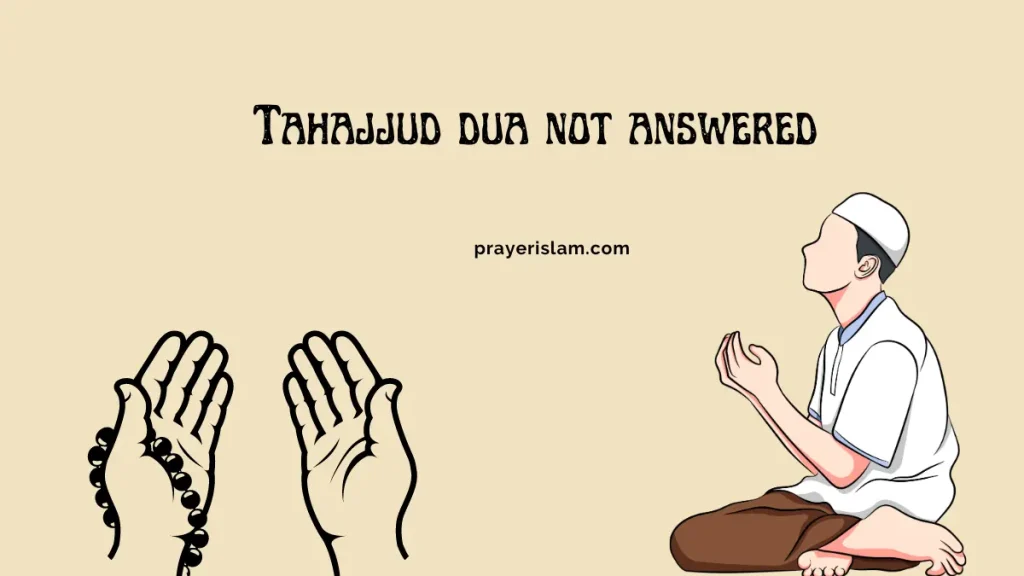Tahajjud is not just a prayer; It is a invitation from allah and a direct means of communication with Allah. We know from the hadith that during this time, the heavens are open and prayers are more likely to be answered. Moreover Tahajjud dua not answered, what is the reason and solution?
For believers, unanswered prayers can be a source of confusion, doubt and even distress. They may question the sincerity of their prayers. They may wonder if they are being heard at all. In the case of tahajjud, where the spiritual connection is believed to be exceptionally strong, the frustration of unanswered dua can be particularly intense.
There is no answer to Tahajjud Dua
Let’s know the reasons for Tahajjud dua not being answered:
- Allah’s Wisdom: Allah is All-Knowing and All-Knowing, so He may choose not to answer a particular kuna dua because of His greater knowledge of what is best for His servants. As parents withhold something from their children, knowing that it is not in their best interest. Allah may choose not to grant a request if it is contrary to His divine wisdom.
- Tests of Faith: Trials and tribulations are tests of faith in Islam. Sometimes Allah delays answering a supplication to test the patience, perseverance and faith of His servant. These testing times allow believers to strengthen their reliance on Allah and deepen their faith. It ultimately leads to spiritual growth.
- Greater Good: There may be instances where what we want is not in our best interest, or there may be a better alternative that Allah has planned for us. Allah, in His infinite mercy, may delay the response to a supplication to provide something better in the future, or to protect us from harm that we cannot imagine.
- Sin and distractions: Our sins and negligence can act as a barrier between us and Allah. Haram foods or actions hinder our prayers from being answered. If our hearts are not pure or our actions contradict our prayers, it can affect the effectiveness of our duas. Engaging in repentance and striving to improve our character and conduct can help remove these obstacles.
- Timing: Allah’s timing is perfect. He may choose to delay responding to a call until the time is right. Be it for the benefit of the supplicant or only for reasons known to him. Patience is key in these situations, as believers trust in Allah’s timing and wisdom.
- Unseen Knowledge: There may be aspects of Allah’s plan that are beyond human understanding. What may seem like an unanswered prayer in the present moment may actually be part of a larger plan that will unfold in due time. Believers trust in Allah’s wisdom and submit to His will, even when they do not understand the reasons behind His decisions.
Way to solve

When we face Tahajjud dua not answered situation, we can take several steps to solve the problem.
- Strengthening faith and patience: It is very important to strengthen our faith and patience while facing Tahajjud dua not answered. Reminding ourselves of Allah’s wisdom and trusting that He knows what is best for them. Although they do not understand his plan.
- Self-Reflection and Repentance: It is important to engage in self-reflection and repentance in order to identify any sin or error that may be hindering the prayer being answered. By apologizing and trying to improve one’s character and conduct.
- Persistent Prayer: Persistence in dua is encouraged in Islam. We should sincerely pray to Allah expressing our needs, desires and concerns. Consistency and sincerity in dua shows dependence on Allah. It reaffirms faith in His mercy and responsiveness.
- Diversify the content of the request: Sometimes, focusing only on a specific request can lead to frustration if it is missing. Believers can diversify their dua content by including prayers for various aspects of their lives such as spiritual growth, family well-being, community well-being and success in this life and the hereafter.
- Seeking Knowledge and Guidance: Increasing one’s knowledge of Islam and seeking guidance from knowledgeable scholars can provide insight into the significance of unanswered prayers and strategies for dealing with them. Learning about the stories of prophets and righteous people who faced trials and tests of faith. It can inspire believers to persevere in their own journey.
- Accepting and Trusting Allah’s Plan: Ultimately, accepting Allah’s orders and trusting in His plan is the key to peace and contentment. Believers should remember that Allah’s timing is perfect and He responds to prayers in the best way. By not granting our request, delaying it for a better time or replacing it with something more beneficial.
- Worship and Charity: Engaging in extra acts of worship, such as voluntary prayer, reciting the Qur’an and giving charity. It will serve as a means of gaining closeness to Allah and seeking His grace. These actions show sincerity and devotion and can increase the chances of prayer being answered.
FAQs
Why do my Tahajjud duas sometimes go unanswered?
Unanswered prayers are a common experience for many believers, and there can be various reasons behind them. Sometimes, Allah’s wisdom dictates that a particular dua is not granted due to His greater knowledge of what is best for His servants. It could also be a test of faith, a means of purification from sins, or a delay for a better time or a greater good.
Does the lack of an immediate response to my Tahajjud dua mean that Allah isn’t listening to me?
No, it doesn’t. Allah is always listening to the prayers of His servants, including those offered during Tahajjud. The delay in the response to a dua does not signify neglect but rather reflects Allah’s wisdom and His plan, which may unfold in ways that are beyond our comprehension.
How can I cope with the disappointment of an unanswered Tahajjud dua?
Coping with the disappointment of an unanswered dua requires patience, faith, and trust in Allah’s plan. Believers should remind themselves that Allah knows what is best for them and that unanswered prayers are not a reflection of His lack of care or attention. Seeking comfort in acts of worship, seeking knowledge, and surrounding oneself with a supportive community can also help in coping with disappointment.
What should I do if my Tahajjud duas consistently go unanswered?
If you feel that your Tahajjud duas consistently go unanswered, it’s essential to engage in self-reflection and introspection. Evaluate your intentions, actions, and adherence to Islamic teachings. Seek guidance from knowledgeable scholars or spiritual mentors who can offer insights and advice tailored to your specific circumstances.
Is there a specific way to make my Tahajjud duas more likely to be answered?
While there is no guaranteed formula for ensuring that a dua is answered, certain actions can increase the likelihood of acceptance. These include sincerity in supplication, humility before Allah, persistence in dua, seeking forgiveness for sins, and performing additional acts of worship such as voluntary prayers, recitation of Quran, and charity.
How can I maintain hope and faith in Allah’s mercy despite experiencing unanswered Tahajjud duas?
Maintaining hope and faith in Allah’s mercy requires steadfastness in belief and trust in His wisdom. Remind yourself of Allah’s attributes of mercy and compassion, and reflect on the blessings and answered prayers you have experienced in the past. Seek solace in Quranic verses and prophetic traditions that emphasize Allah’s responsiveness to the prayers of His sincere servants.
Should I stop making Tahajjud duas if they are consistently unanswered?
No, believers should not cease making Tahajjud duas simply because they perceive them as unanswered. The act of supplication itself is valuable and serves to strengthen one’s relationship with Allah. Instead, continue to make dua with sincerity and perseverance, trusting that Allah hears every prayer and responds in the best possible way, whether immediately or in the future.







